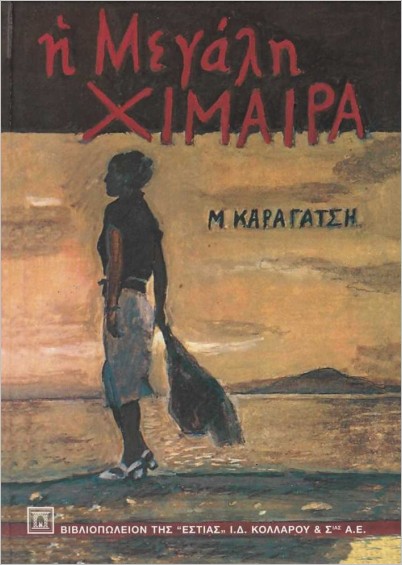Η ΜΕΓΑΛΗ ΧΙΜΑΙΡΑ / THE GREAT CHIMERA
 “>
“>
Author:
M. KARAGATSIS
Country:
Greece (GR)
Book Theme:
Classic novels and Authors representing your country culture
Publisher:
ESTIA
Publishing Year:
2016
M. Karagatsis, born Dimitrios Rodopoulos, was a Greek novelist and journalist, known for his vivid storytelling and deep psychological insight. A key figure in modern Greek literature, he was part of the “Generation of the ’30s.” His works, including The Great Chimera, Colonel Liapkin, and Junkermann, explore themes of passion, identity, and fate. Karagatsis’ writing is marked by realism, sensuality, and strong character development. His untimely death at 52 left several unfinished works, but his legacy endures as one of Greece’s most influential 20th-century authors.
National Award for Children’s and Young People’s
Abstract
The Great Chimera (Η Μεγάλη Χίμαιρα), first published in 1936, is one of M. Karagatsis’ most celebrated novels, blending passion, tragedy, and psychological depth. The story follows Marina, a young French woman who, seeking escape from her troubled past, marries a Greek shipowner, Yorgos Roussos, and moves to the island of Syros. At first enchanted by Greece’s beauty and culture, she gradually becomes consumed by an intense and destructive love for her new homeland and its people.
Marina, a young and romantic Frenchwoman, arrives in Greece after marrying Yorgos Roussos, a wealthy Greek shipowner from Syros. Enthralled by her new surroundings, she dreams of a harmonious life, embracing Greek culture and traditions. However, despite her efforts, she struggles to integrate fully into her husband’s world, facing the disapproval of his conservative mother and the rigid expectations of Greek society.
As Marina’s initial enchantment fades, she becomes increasingly isolated. Her longing for passion and connection leads her into a dangerous affair with Michalis, Yorgos’ younger brother, a reckless and impulsive man. The affair, charged with desire and guilt, sets off a tragic chain of events. When Yorgos learns of the betrayal, he is devastated, and fate delivers its final blows through financial ruin, loss, and Marina’s own psychological collapse.
Haunted by her illusions and failures, Marina descends into despair, realizing too late that the Greece she loved was an unattainable dream—a “great chimera.” The novel ends in tragedy, reinforcing the idea that desire, fate, and cultural clashes can lead to inevitable destruction.
M. Karagatsis crafts a deeply psychological and emotionally intense narrative, portraying Marina as both a victim of circumstance and a woman undone by her own passions. Through The Great Chimera, he explores themes of identity, belonging, love, and the power of illusions, making it one of the most compelling works of modern Greek literature.



